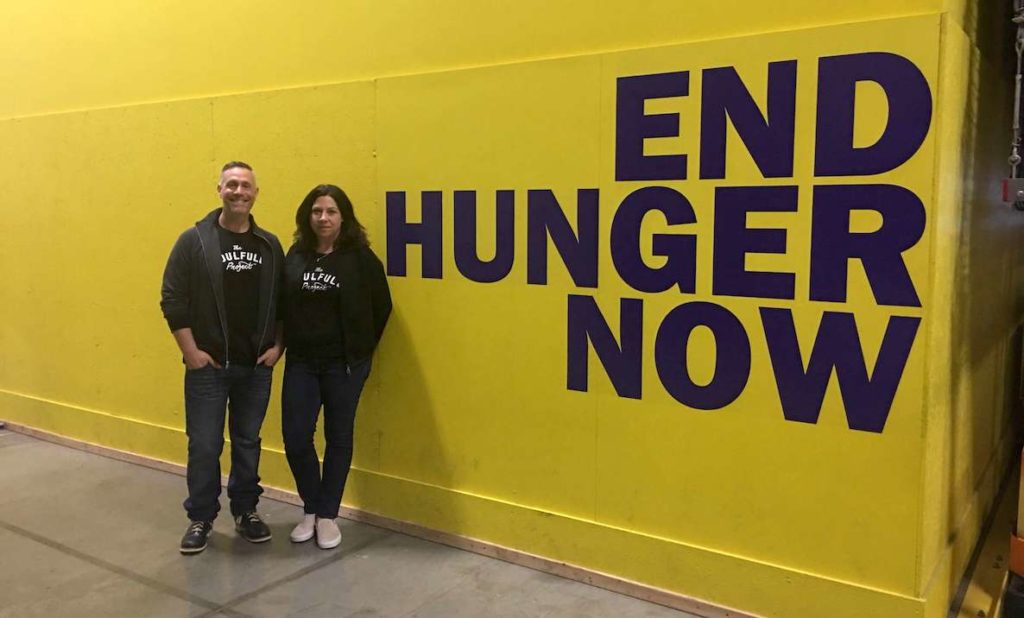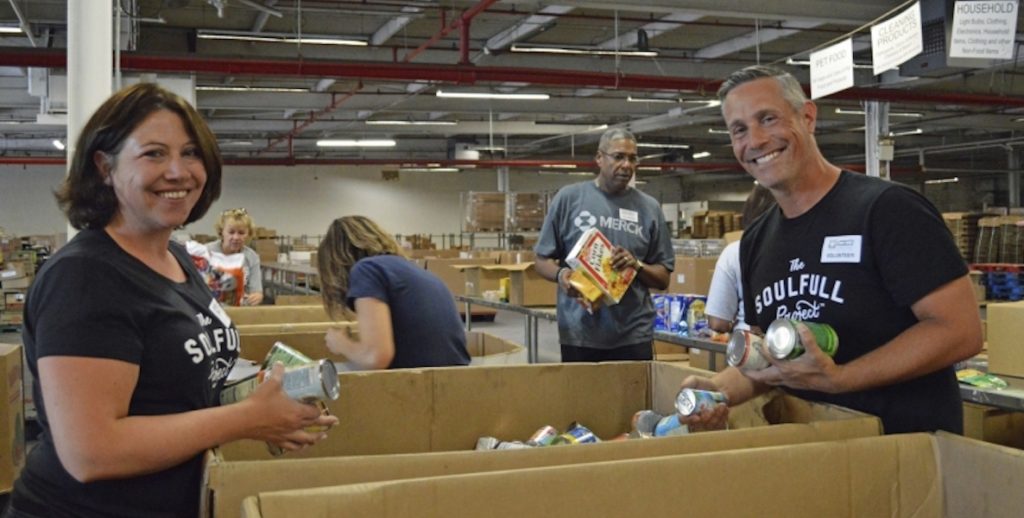There was nothing in the kitchen—no milk, no cans, no soup. Nothing.
It was Megan Shea and Chip Heim’s final stop as part of a series of consumer interviews in Texas for Campbell’s Soup Company, and the coworkers were visiting the home of a single mom of three young kids. What they discovered left them bereft.
“They lived hand-to-mouth,” recalls Heim. “Before she went to work the night shift, mom would take her kids to the local Walmart to buy dinner.”
The visit stuck with the pair, who at that time in 2014 were both working on Campbell’s innovation team. Heim had grown up watching his mother give back to the community through tireless church work; Shea, whose grandparents had immigrated from Ireland and whose parents were children of the Depression, was raised with the spirit of helping those who came behind you. They wanted to do something, but they shelved that instinct, as life got in the way.

Then, a few years later, while working late one night in the Campbell’s warehouse in Camden, they heard a knock at the door.
This time, it was a mom and her kids, asking if the warehouse had any food to spare. “We grabbed cans and made her a package. Then we looked at each other and said, We have to do something,” says Heim. They immediately began dreaming up a way to make it easier to give back, and to give consumers an opportunity to help people while helping themselves.
Working at night in addition to their day jobs, they came up with The Soulfull Project, a line of healthy, nutrient-rich oatmeal. For every purchase, the company donates a serving of the company’s four-grain cereal to a food bank in the area where it was purchased.
They met with food banks to figure out where and how they could have the most impact. “We decided to start with oatmeal very intentionally, both because it’s one of the most-needed items at food banks, and because breakfast can really set the tone for the whole day,” Shea explains.
Nationally, one in eight people face food insecurity; in Philadelphia, that figure is one in five. About 700,000 people in Philabundance’s nine-county service area go to bed at night not knowing where their next meal will come from, or if they’ll have one at all. “Each week, Philabundance provides food for nearly 90,000 individuals, and the team at The Soulfull Project gets that,” says Elizabeth Sanon, Philabundance’s manager of food acquisition. “Their one-for-one model is admirable and we are so grateful for the 3,800 pounds The Soulfull project has donated thus far.”
“If you can channel that passion that the city has towards doing something like helping people, it’s just amazing,” says Heim. “We know that we can make a huge impact—we see it when our donations are dropped off, and we’re really proud to be a part of it.”
Soon after launching their oatmeal brand in 2016, Soulfull got buy-in from 14 local Wegman’s and three food banks, then decided it was time to present the idea to Campbell’s leadership. Campbell’s was enthusiastic, telling the duo that if they quit their jobs to focus on The Soulfull Project, Campbell’s would back them, financially, as they started out. Then, last year, when Campbell’s went through a transition, Shea and Heim decided to spin their company out. Heim had always thought about running his own business; ironically, Shea, who was raised by two entrepreneur parents, had sworn after business school that she’d never strike out on her own. (“It goes to show you that your parents really do know best!” she now jokes.)
They’re now completely independent, and their footprint has increased exponentially: They work with more than 200 food banks around the country, and their products are in stores nationwide (and at the Philly airport). In January, they’ll be in all Whole Foods Markets. And over the last year, they doubled their staff, going from “two-and-a-half” employees to five. (Their manufacturer is a family-owned business in Canada.)
From their new digs in Frankford Arsenal, north of the Betsy Ross Bridge—an area that’s rapidly becoming a hub for startups—Shea and Heim talked about their decision to be a business, versus a nonprofit. “We think that business can be used as a force for good, that we can provide an opportunity for people to give back with the things that they buy every day,” Shea says.
They’re not profitable yet, though they have a plan to get there. “We are very much a small growing business. The food retail space is incredibly competitive, and the cost to pay or play that you have to do with the retailers can put an enormous burden on any company, let alone one that has a mission,” Shea says.
On top of that, their marketing relies completely on word-of-mouth: They use the money that would normally go toward advertising to fund the donations. That, Shea says, is a huge constraint.
It’s a constraint that’s led them to be very strategic, and drove them to become a Certified B Corporation, a legal designation that holds them accountable to employees, suppliers and the community to stand by their mission. Heim relishes being plugged into the Berwin-based B-Corp community, co-founded by local Jay Coen Gilbert: “It’s a great resource to help us grow the company.”
Since 2016, Soulfull has accumulated 2.5 million servings to be donated to food banks nationwide; they’re preparing to do their next big donation run of 1 million of those servings.
A big secret to their success: Philly.
“If you had to pick a city that has passion, I don’t think you can pick one better than Philly,” says Heim, a Bucks County native. (Shea is a New York transplant.) They’re grateful to the schools and colleges that have rallied behind efforts like their weekend backpack program, and to their own young kids, who have come along on donation runs and gotten their classmates on board to join the fight against hunger.
“If you can channel that passion that the city has towards doing something like helping people, it’s just amazing. We know that we can make a huge impact—we see it when our donations are dropped off, and we’re really proud to be a part of it.”
RELATED
Foodizen Podcast: The Most Famous Soup You’ve Never Heard Of

